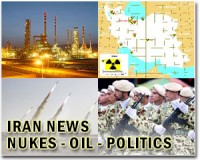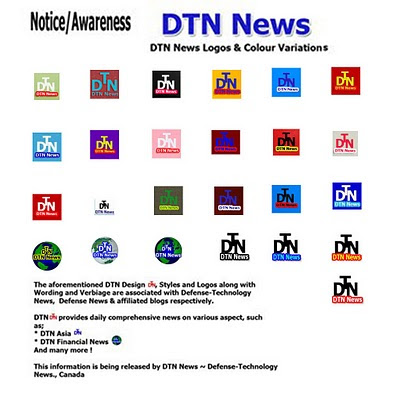 US move on Iran a big shift from 'axis of evil' days, analysts say
Washington - July 17, 2008: The Bush administration's move to join Iran at nuclear talks echoes its pragmatic steps toward North Korea and shows how far it has come from the "axis of evil" days, analysts said Wednesday.
William Burns, the third-ranking US diplomat, is due to meet Iran's nuclear negotiator Saeed Jalili in Geneva Saturday on a mission to bolster international demands for Tehran to halt uranium enrichment, US officials say.
Having long insisted that Iran suspend enrichment before meeting its nuclear envoys, officials from President George W. Bush's administration have effectively dropped their pre-conditions, according to analysts.
"This is a dramatic reversal for the Bush administration. It's similar to the switch they made in 2006 with the North Koreans," non-proliferation expert Joseph Cirincione told AFP.
In October 2006, the United States announced a return to six-country negotiations with North Korea after taking a hard line that failed to prevent North Korea from staging its first nuclear test.
In both cases "the administration had refused to have direct talks with their adversary," according to Cirincione, the president of the peace-promoting Ploughshares Fund.
"But once they did with North Korea, it led to the breakthrough that is now reversing perhaps permanently North Korea's nuclear program."
Following a landmark deal last year, North Korea last month moved to dismantle its weapons-grade plutonium program when it gave a partial accounting of its atomic programs and promised to finish disabling its reactor.
Although the administration admits North Korea still has a long way to go toward total denuclearization, it no longer bows to US conservatives who demand Pyongyang's isolation.
"From the beginning of the administration there has been a struggle between the pragmatists who have been willing to negotiate with both North Korea and Iran and hardliners who are trying to overthrow those regimes," Cirincione said.
"The pragmatists have finally won on North Korea in the last couple of years, and now their position seems to be prevailing on Iran," he added.
US officials said Secretary of State Condoleezza Rice consulted with Bush before deciding to send Burns to Geneva. Yet, in January 2002, Bush accused Iran, along with Iraq and North Korea, of forming an "axis of evil."
Suzanne Maloney, a former State Department policy expert on Iran, told AFP the new US diplomatic move was significant but in line with a long, tortured series of steps to engage Iran in nuclear negotiations.
"I don't know we're at that conclusive a shift at this stage," the Brookings Institution expert said when asked if Washington was about to engage Tehran the way it has dealt with Pyongyang.
For one thing, Washington's decision to send Burns to Geneva and yet prevent him from negotiating with Iran "appears to me to be sort of a ludicrous hedge on the part of the administration" that may block results, Maloney said.
"That said, having direct exposure to an Iranian diplomat is a huge improvement," she added.
Washington-based analyst Trita Parsi said the administration has realized its strategy of "insisting on preconditions has been utterly counterproductive and has only made a bad situation worse."
At the same time hardline political appointees "are one by one leaving the administration, creating space for career diplomats to start running the show," he said.
"That's part of the reason why we have seen a shift in America's policy toward North Korea and we're starting to see a shift in its position toward Iran as well," said Parsi, the president of the National Iranian American Council.
While hailing the US move, Parsi doubted Iran would agree to negotiate a full suspension of its uranium enrichment if the US continues to aim at eliminating rather than limiting Iran's nuclear enrichment program.
US move on Iran a big shift from 'axis of evil' days, analysts say
Washington - July 17, 2008: The Bush administration's move to join Iran at nuclear talks echoes its pragmatic steps toward North Korea and shows how far it has come from the "axis of evil" days, analysts said Wednesday.
William Burns, the third-ranking US diplomat, is due to meet Iran's nuclear negotiator Saeed Jalili in Geneva Saturday on a mission to bolster international demands for Tehran to halt uranium enrichment, US officials say.
Having long insisted that Iran suspend enrichment before meeting its nuclear envoys, officials from President George W. Bush's administration have effectively dropped their pre-conditions, according to analysts.
"This is a dramatic reversal for the Bush administration. It's similar to the switch they made in 2006 with the North Koreans," non-proliferation expert Joseph Cirincione told AFP.
In October 2006, the United States announced a return to six-country negotiations with North Korea after taking a hard line that failed to prevent North Korea from staging its first nuclear test.
In both cases "the administration had refused to have direct talks with their adversary," according to Cirincione, the president of the peace-promoting Ploughshares Fund.
"But once they did with North Korea, it led to the breakthrough that is now reversing perhaps permanently North Korea's nuclear program."
Following a landmark deal last year, North Korea last month moved to dismantle its weapons-grade plutonium program when it gave a partial accounting of its atomic programs and promised to finish disabling its reactor.
Although the administration admits North Korea still has a long way to go toward total denuclearization, it no longer bows to US conservatives who demand Pyongyang's isolation.
"From the beginning of the administration there has been a struggle between the pragmatists who have been willing to negotiate with both North Korea and Iran and hardliners who are trying to overthrow those regimes," Cirincione said.
"The pragmatists have finally won on North Korea in the last couple of years, and now their position seems to be prevailing on Iran," he added.
US officials said Secretary of State Condoleezza Rice consulted with Bush before deciding to send Burns to Geneva. Yet, in January 2002, Bush accused Iran, along with Iraq and North Korea, of forming an "axis of evil."
Suzanne Maloney, a former State Department policy expert on Iran, told AFP the new US diplomatic move was significant but in line with a long, tortured series of steps to engage Iran in nuclear negotiations.
"I don't know we're at that conclusive a shift at this stage," the Brookings Institution expert said when asked if Washington was about to engage Tehran the way it has dealt with Pyongyang.
For one thing, Washington's decision to send Burns to Geneva and yet prevent him from negotiating with Iran "appears to me to be sort of a ludicrous hedge on the part of the administration" that may block results, Maloney said.
"That said, having direct exposure to an Iranian diplomat is a huge improvement," she added.
Washington-based analyst Trita Parsi said the administration has realized its strategy of "insisting on preconditions has been utterly counterproductive and has only made a bad situation worse."
At the same time hardline political appointees "are one by one leaving the administration, creating space for career diplomats to start running the show," he said.
"That's part of the reason why we have seen a shift in America's policy toward North Korea and we're starting to see a shift in its position toward Iran as well," said Parsi, the president of the National Iranian American Council.
While hailing the US move, Parsi doubted Iran would agree to negotiate a full suspension of its uranium enrichment if the US continues to aim at eliminating rather than limiting Iran's nuclear enrichment program.
Thursday, July 17, 2008
US move on Iran a big shift from 'axis of evil' days, analysts say
 US move on Iran a big shift from 'axis of evil' days, analysts say
Washington - July 17, 2008: The Bush administration's move to join Iran at nuclear talks echoes its pragmatic steps toward North Korea and shows how far it has come from the "axis of evil" days, analysts said Wednesday.
William Burns, the third-ranking US diplomat, is due to meet Iran's nuclear negotiator Saeed Jalili in Geneva Saturday on a mission to bolster international demands for Tehran to halt uranium enrichment, US officials say.
Having long insisted that Iran suspend enrichment before meeting its nuclear envoys, officials from President George W. Bush's administration have effectively dropped their pre-conditions, according to analysts.
"This is a dramatic reversal for the Bush administration. It's similar to the switch they made in 2006 with the North Koreans," non-proliferation expert Joseph Cirincione told AFP.
In October 2006, the United States announced a return to six-country negotiations with North Korea after taking a hard line that failed to prevent North Korea from staging its first nuclear test.
In both cases "the administration had refused to have direct talks with their adversary," according to Cirincione, the president of the peace-promoting Ploughshares Fund.
"But once they did with North Korea, it led to the breakthrough that is now reversing perhaps permanently North Korea's nuclear program."
Following a landmark deal last year, North Korea last month moved to dismantle its weapons-grade plutonium program when it gave a partial accounting of its atomic programs and promised to finish disabling its reactor.
Although the administration admits North Korea still has a long way to go toward total denuclearization, it no longer bows to US conservatives who demand Pyongyang's isolation.
"From the beginning of the administration there has been a struggle between the pragmatists who have been willing to negotiate with both North Korea and Iran and hardliners who are trying to overthrow those regimes," Cirincione said.
"The pragmatists have finally won on North Korea in the last couple of years, and now their position seems to be prevailing on Iran," he added.
US officials said Secretary of State Condoleezza Rice consulted with Bush before deciding to send Burns to Geneva. Yet, in January 2002, Bush accused Iran, along with Iraq and North Korea, of forming an "axis of evil."
Suzanne Maloney, a former State Department policy expert on Iran, told AFP the new US diplomatic move was significant but in line with a long, tortured series of steps to engage Iran in nuclear negotiations.
"I don't know we're at that conclusive a shift at this stage," the Brookings Institution expert said when asked if Washington was about to engage Tehran the way it has dealt with Pyongyang.
For one thing, Washington's decision to send Burns to Geneva and yet prevent him from negotiating with Iran "appears to me to be sort of a ludicrous hedge on the part of the administration" that may block results, Maloney said.
"That said, having direct exposure to an Iranian diplomat is a huge improvement," she added.
Washington-based analyst Trita Parsi said the administration has realized its strategy of "insisting on preconditions has been utterly counterproductive and has only made a bad situation worse."
At the same time hardline political appointees "are one by one leaving the administration, creating space for career diplomats to start running the show," he said.
"That's part of the reason why we have seen a shift in America's policy toward North Korea and we're starting to see a shift in its position toward Iran as well," said Parsi, the president of the National Iranian American Council.
While hailing the US move, Parsi doubted Iran would agree to negotiate a full suspension of its uranium enrichment if the US continues to aim at eliminating rather than limiting Iran's nuclear enrichment program.
US move on Iran a big shift from 'axis of evil' days, analysts say
Washington - July 17, 2008: The Bush administration's move to join Iran at nuclear talks echoes its pragmatic steps toward North Korea and shows how far it has come from the "axis of evil" days, analysts said Wednesday.
William Burns, the third-ranking US diplomat, is due to meet Iran's nuclear negotiator Saeed Jalili in Geneva Saturday on a mission to bolster international demands for Tehran to halt uranium enrichment, US officials say.
Having long insisted that Iran suspend enrichment before meeting its nuclear envoys, officials from President George W. Bush's administration have effectively dropped their pre-conditions, according to analysts.
"This is a dramatic reversal for the Bush administration. It's similar to the switch they made in 2006 with the North Koreans," non-proliferation expert Joseph Cirincione told AFP.
In October 2006, the United States announced a return to six-country negotiations with North Korea after taking a hard line that failed to prevent North Korea from staging its first nuclear test.
In both cases "the administration had refused to have direct talks with their adversary," according to Cirincione, the president of the peace-promoting Ploughshares Fund.
"But once they did with North Korea, it led to the breakthrough that is now reversing perhaps permanently North Korea's nuclear program."
Following a landmark deal last year, North Korea last month moved to dismantle its weapons-grade plutonium program when it gave a partial accounting of its atomic programs and promised to finish disabling its reactor.
Although the administration admits North Korea still has a long way to go toward total denuclearization, it no longer bows to US conservatives who demand Pyongyang's isolation.
"From the beginning of the administration there has been a struggle between the pragmatists who have been willing to negotiate with both North Korea and Iran and hardliners who are trying to overthrow those regimes," Cirincione said.
"The pragmatists have finally won on North Korea in the last couple of years, and now their position seems to be prevailing on Iran," he added.
US officials said Secretary of State Condoleezza Rice consulted with Bush before deciding to send Burns to Geneva. Yet, in January 2002, Bush accused Iran, along with Iraq and North Korea, of forming an "axis of evil."
Suzanne Maloney, a former State Department policy expert on Iran, told AFP the new US diplomatic move was significant but in line with a long, tortured series of steps to engage Iran in nuclear negotiations.
"I don't know we're at that conclusive a shift at this stage," the Brookings Institution expert said when asked if Washington was about to engage Tehran the way it has dealt with Pyongyang.
For one thing, Washington's decision to send Burns to Geneva and yet prevent him from negotiating with Iran "appears to me to be sort of a ludicrous hedge on the part of the administration" that may block results, Maloney said.
"That said, having direct exposure to an Iranian diplomat is a huge improvement," she added.
Washington-based analyst Trita Parsi said the administration has realized its strategy of "insisting on preconditions has been utterly counterproductive and has only made a bad situation worse."
At the same time hardline political appointees "are one by one leaving the administration, creating space for career diplomats to start running the show," he said.
"That's part of the reason why we have seen a shift in America's policy toward North Korea and we're starting to see a shift in its position toward Iran as well," said Parsi, the president of the National Iranian American Council.
While hailing the US move, Parsi doubted Iran would agree to negotiate a full suspension of its uranium enrichment if the US continues to aim at eliminating rather than limiting Iran's nuclear enrichment program.
Subscribe to:
Post Comments (Atom)


















No comments:
Post a Comment